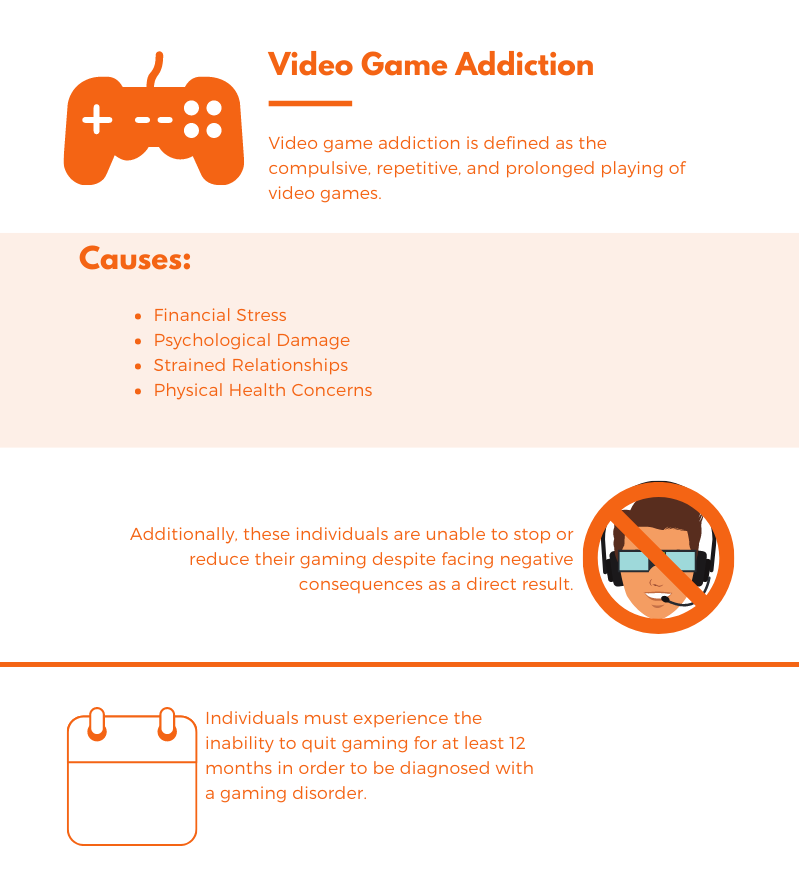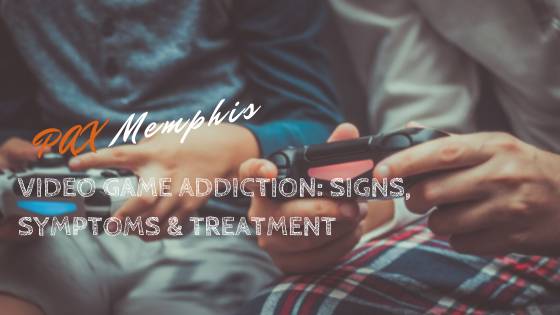Addiction is a disease that can encompass preoccupation with many different things, such as different substances and behaviors. While most people associate addiction with the uncontrollable desire to use drugs or drink alcohol, it is possible to become addicted to typical activities, such as video games. Video games provide a great source of entertainment for many people and even contribute to many health benefits such as improved vision, creativity, and cognition when played in moderation. However, individuals who are prone to addiction can become seemingly obsessed with video games. When the act of playing video games begins to become prioritized over an individual’s career, relationships, and obligations – the individual is suffering from video game addiction.
Video game addiction, also known as gaming disorder, is a type of behavioral addiction that can wreak havoc on an individual’s life. Much like an addiction to drugs, this condition also causes financial stress, psychological damage, strained relationships, and physical health concerns. Although video game addiction is not currently recognized by the American Medical Association as a diagnosable disorder, this addiction is extremely real and detrimental for many individuals. In fact, according to research, nearly 1 in 10 youth gamers are addicted to video games. If you’re having trouble stepping away from the gaming console, read more to learn about the signs and symptoms of this disorder as well as how to recover.
What is Video Game Addiction?

To explain further, individuals who play video games for extended periods of time are not necessarily addicted to gaming. However, those who do play video games for long periods of time should be aware of the amount of time they spend doing so in order to prevent their behavior from becoming problematic. Additionally, frequent gamers should be aware of any adverse changes to their health and social functioning that may be caused by their gaming habit. If an individual is displaying signs of video game addiction, they should seek professional help in order to take the appropriate steps to cut back on gaming and prevent serious adverse health effects.
Signs & Symptoms of Video Game Addiction
Individuals suffering from video game addiction tend to prioritize gaming above all other activities. In other words, the condition causes individuals to neglect activities and obligations such as personal hygiene, their job, their family, and education. Video game addiction shares many of the signs of other behavioral addictions like gambling addiction, sex addiction, or shopping addiction. Behavioral addictions can worsen the state of an individual’s physical, emotional, and psychological health.
Gaming disorder can be diagnosed if an individual meets any of the following diagnostic criteria:
- Lying to friends, family, and therapists surrounding your video gaming activity
- Playing video games to escape problems or to relieve negative feelings of guilt, helplessness, anxiety, or depression
- Feeling a heightened sense of euphoria when playing video games
- Withdrawing from other pleasurable activities so you can play video games
- Ignoring or neglecting friends and family to play video games
- Neglecting sleep so you can play video games
- Gaining or losing weight
- Back or neck pain
- Headaches
- Carpal tunnel syndrome
- Preoccupation with playing video games, such as thinking or obsessing about previous gaming sessions or future gaming sessions
- Feeling the urge to play video games for longer periods of time to achieve euphoria and satisfaction
- Being unable to control, reduce, or stop the act of playing video games
- Feeling moody, restless, depressed, or irritable when trying to reduce or stop gaming
- Playing video games for longer than originally intended
- Having jeopardized or risked your job, education, or a significant relationship due to gaming
Additional signs include being constantly preoccupied with video games, only feeling happy when playing video games, and spending more time gaming than socializing with friends or family. If you or a loved one are displaying signs of gaming disorder, professional help can prevent this addiction from further affecting your life. (romantichoneymoonisland.com)
Personalized Treatment to Meet Your Needs
Gaming disorder is treated utilizing behavioral therapies and mutual support groups, much like the treatment of a substance use disorder. In the case of teen video game addiction, family therapy may be implemented when beneficial. Behavioral therapies, such as cognitive-behavioral therapy, wilderness therapy, individual and group counseling, family therapy, and 12-step support group therapy are all used in the treatment of video game addiction. Many cases of video game addiction stem from poor social skills, low self-esteem, and mental health conditions like depression. As a result, therapies for video game addiction focus on providing the patient with a full social and emotional recovery.
If you or a loved one are addicted to video games, seeking professional addiction treatment will allow you to regain control of your life. Addiction treatment centers like PAX Memphis employ the most knowledgable and experienced addiction behavior therapists possible, providing patients with the best possible outcome. Contact us today for more information on behavioral addiction treatment.
Medically Reviewed: September 25, 2019

All of the information on this page has been reviewed and verified by a certified addiction professional.










